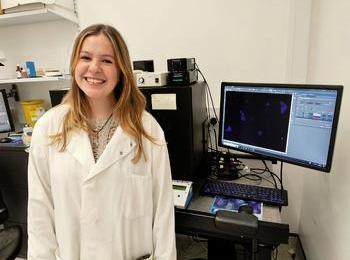Meet Vacation Studentships recipient: Elizabeth Cordell
Posted on March 27, 2025 by Microbiology Society
The Society offers a limited number of Vacation Studentships to enable undergraduates to work on microbiological research projects during their summer vacation. The scheme also gives early- and mid-career scientists the opportunity to gain supervision experience.
Meet the Vacation Studentships recipients and learn more about their journey.

1. What is your name and institution?
Newcastle University, UK
2. Please can you tell us why you applied for the Harry Smith Vacation studentship?
I applied for the studentship because I wanted to experience what a career in research would be like, as well as gaining access to high-end, exciting facilities available on campus. These are not always used during the set lab time included in an undergraduate degree; for instance, access to the Centre for Bacterial Cell Biology, where advanced fluorescence microscopes are available for research compared to traditional light microscopes used in my course.
3. How did you feel when you found out your application was successful?
It was definitely a healthy mix of excitement and nerves! I couldn’t wait to get started, but I did feel apprehensive about entering a new work environment.
4. How would you go-about explaining your research to someone who may not understand science?
Many of us are highly aware of the ongoing global health threat that is antibiotic resistance, where many bacteria have evolved to become resistant to antibiotics that once would have killed them. The broad aim of my research is to tackle this crisis by researching alternative ways to kill these bacteria. More specifically, my research has focused on a bacterial pathogen known as Staphylococcus aureus, which causes around one million deaths per year via antibiotic-resistant infections. The core aim of my project has been to determine the impact of a new antimicrobial system by using various methods, including growth assays and fluorescence microscopy, to assess the level of damage inflicted on bacteria. Growth assays allow us to see millions of cells growing as colonies or not growing at all due to the action of antimicrobials, for instance. In contrast, microscopy allows us to see what is happening inside tiny, single cells that are invisible to the naked eye. Together, this combination enables us to obtain a clearer picture of the challenges bacteria need to overcome to grow in different conditions. Hopefully, in the future, this preliminary data will help the development of new, alternative approaches to prevent antibiotic resistance.
5. What have you learnt from your experience?
This experience has taught me many valuable skills and lessons applicable to both future careers and general life. As well as various new laboratory skills, this experience has taught me a lot about patience and perseverance. Some days you are going to get the results that you hoped for and others you are not, and that’s okay! I have learnt that research is all about problem solving and trying alternative approaches, and the hard work is worth it for the satisfaction of gaining the result that you were looking for.
6. How do you think this vacation will help your career progression?
I believe that this vacation will play an invaluable role in the progression of my future career. Not only does it demonstrate to employers that I have experience in a workplace setting, but it has taught me many new skills that I would not have obtained during my studies alone. Therefore, I feel that this has made me a more well-rounded and experienced potential employee, compared to my peers who did not partake in studentships such as this one.
7. Why is support, such as this grant provided by the Microbiology Society, so important?
Support such as the Harry Smith vacation studentship is really important because it helps students who may not have access to ‘real work’ experiences to gain invaluable insights into potential future careers. This is essential for the development of young people in the field of Science, Technology, Engineering and Mathematics (STEM). Importantly, it also contributes to breaking down socio-economic barriers and promoting inclusivity in a field often depicted as unattainable. Thus, via this grant, the Microbiology Society provides critical help to encourage the next generation of scientists to get into labs.
